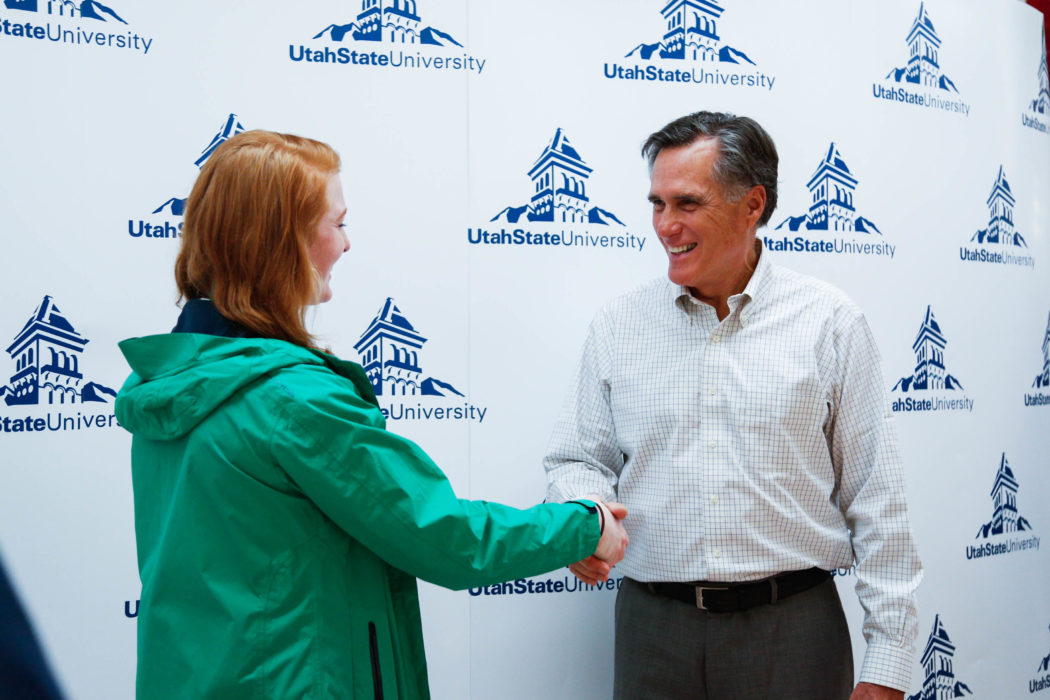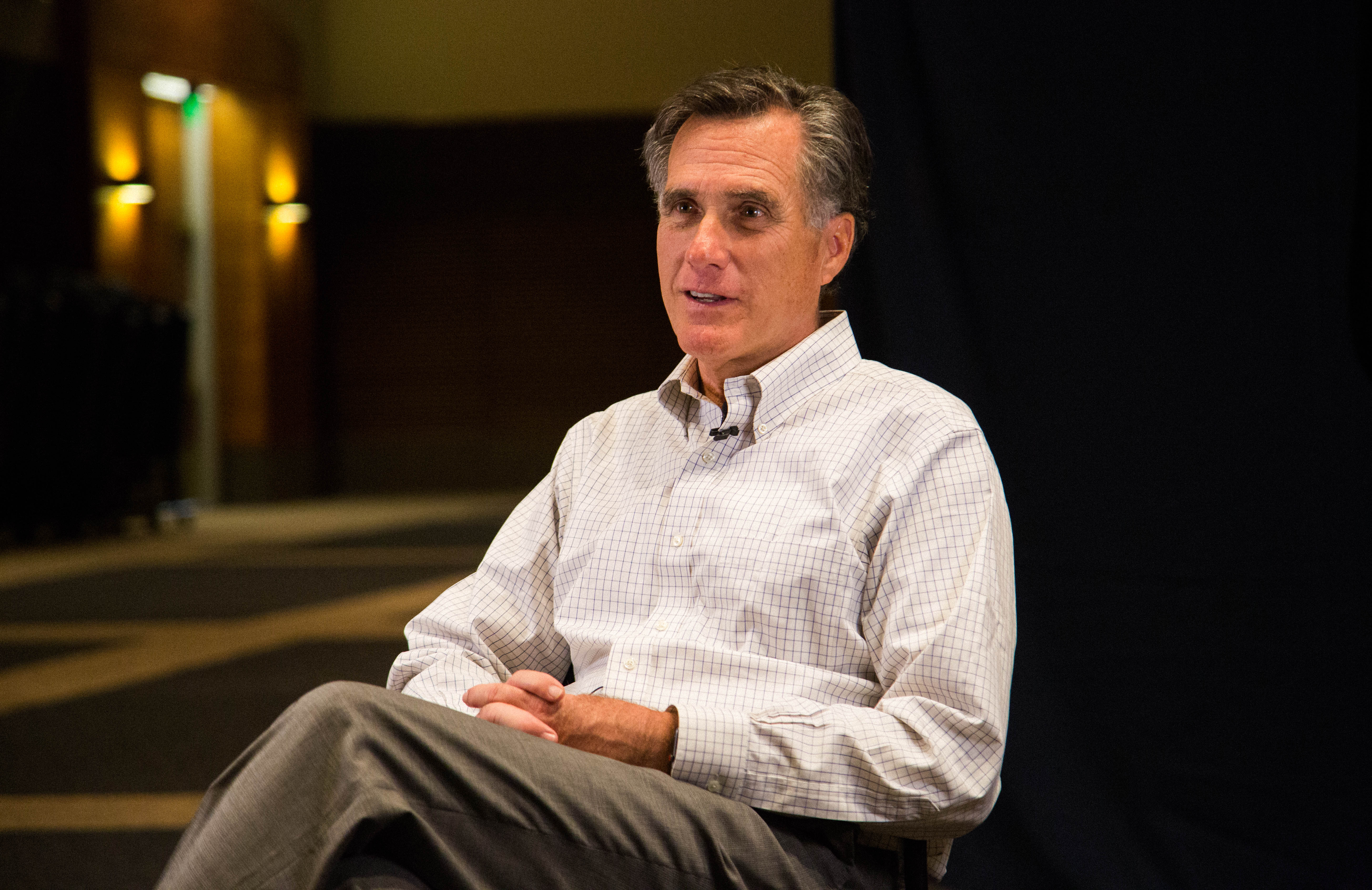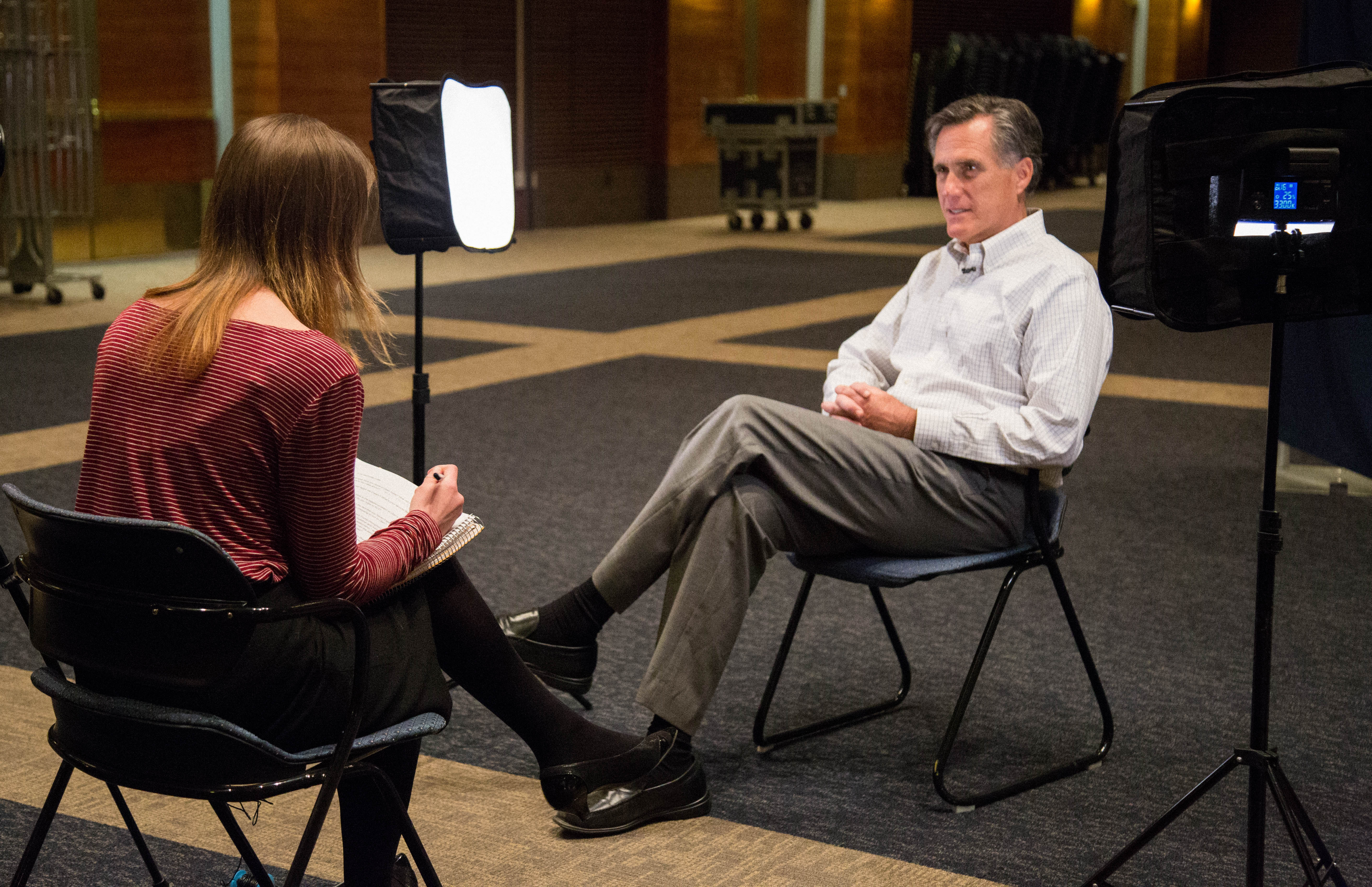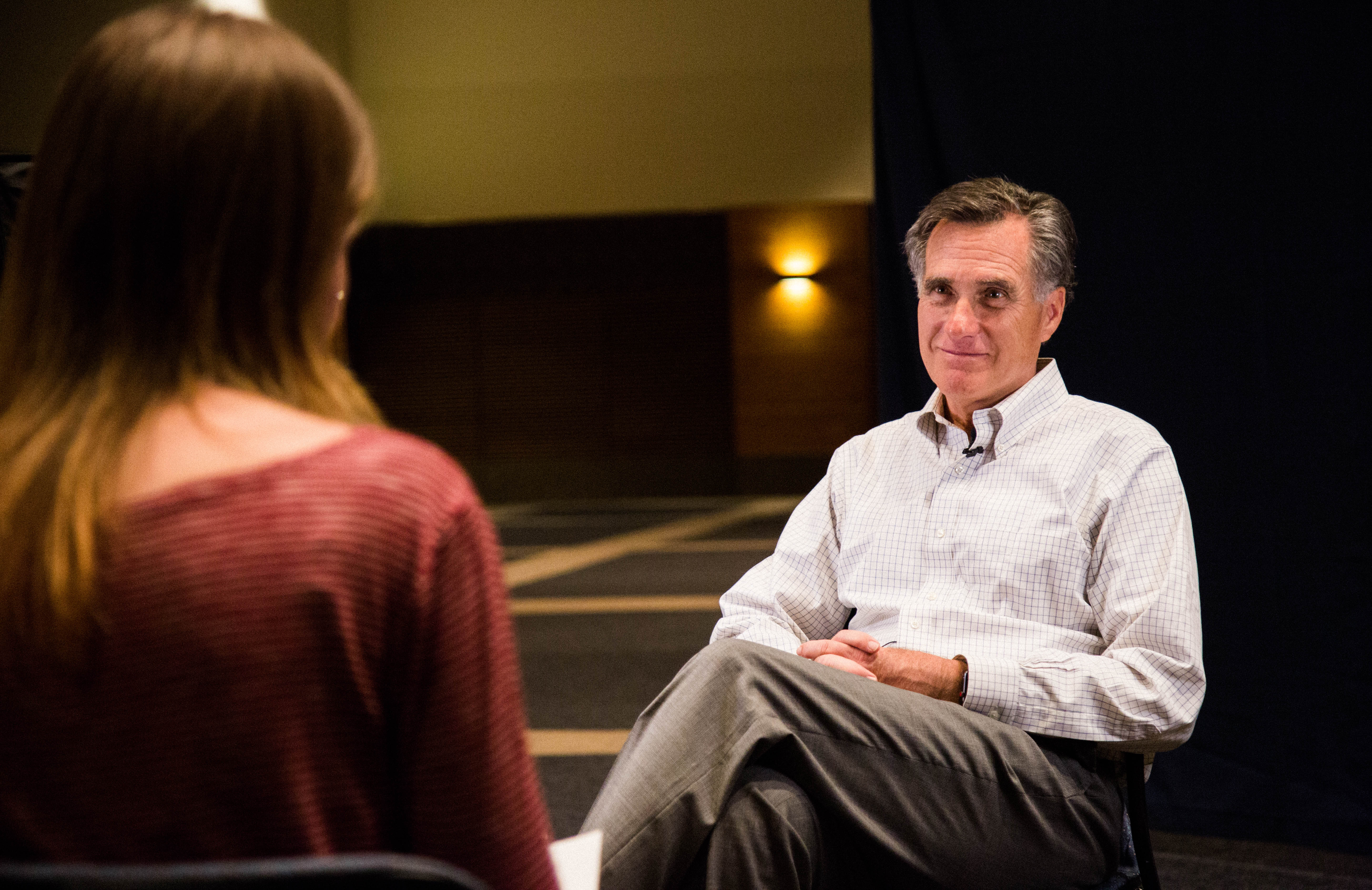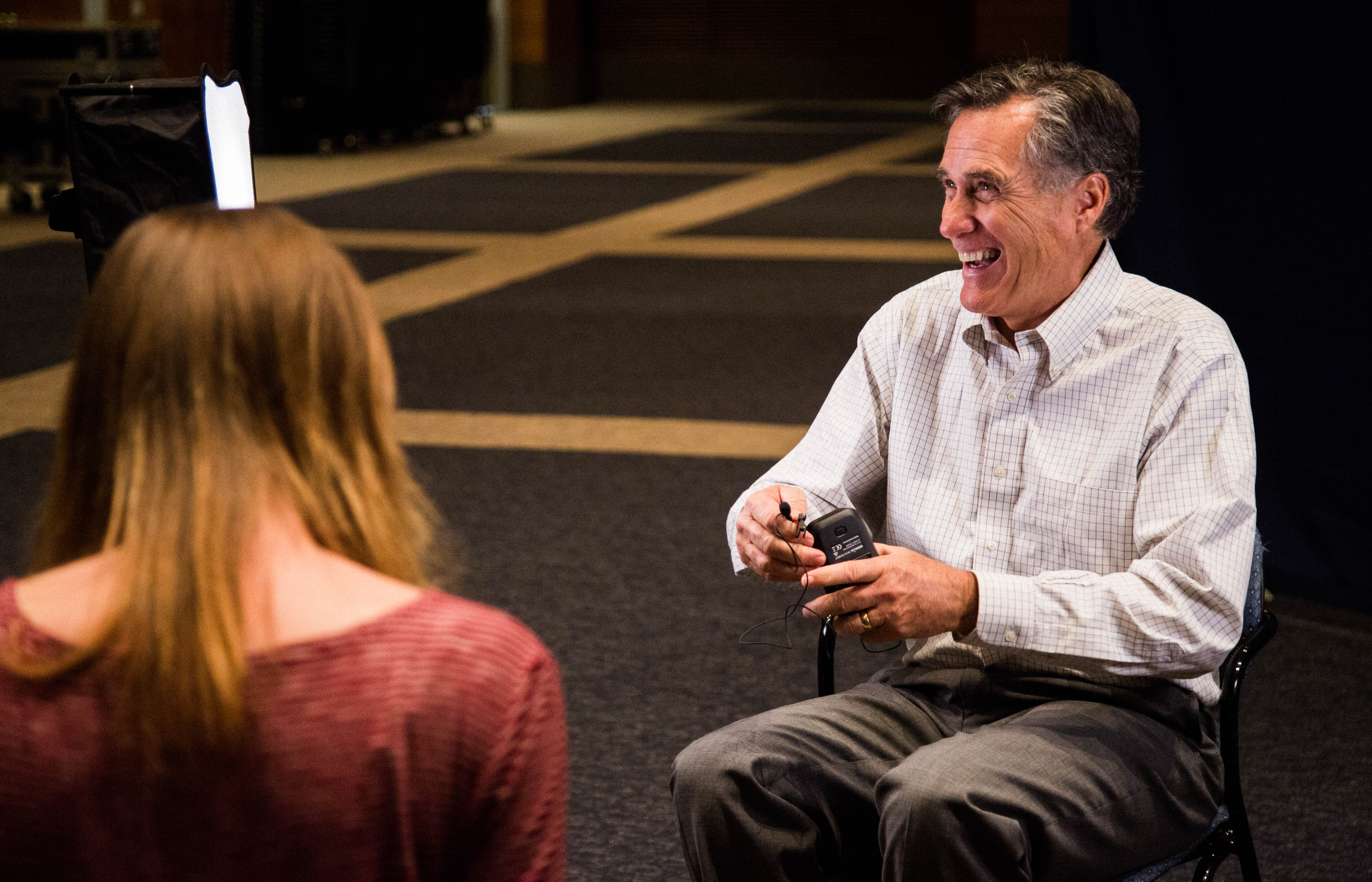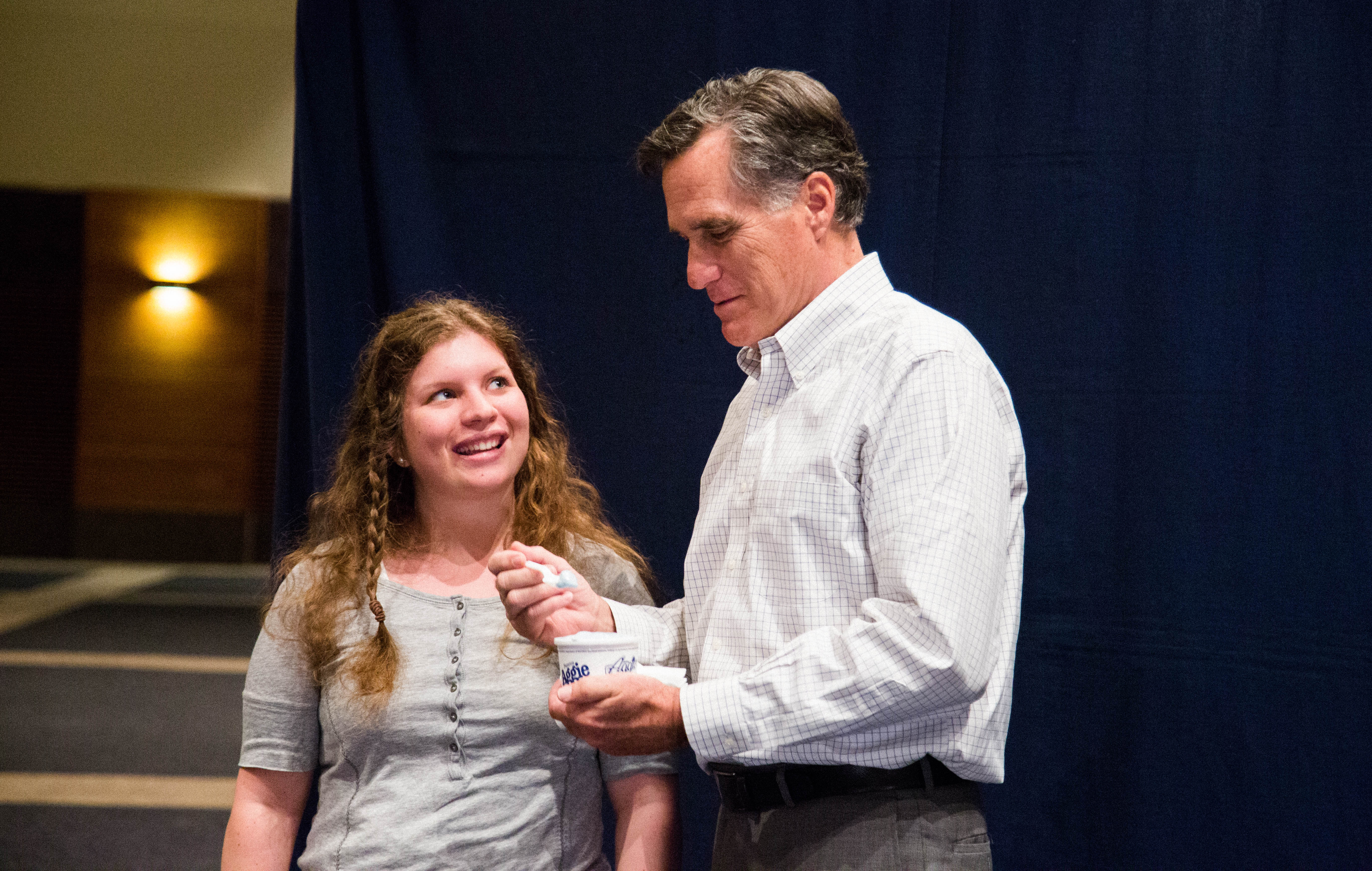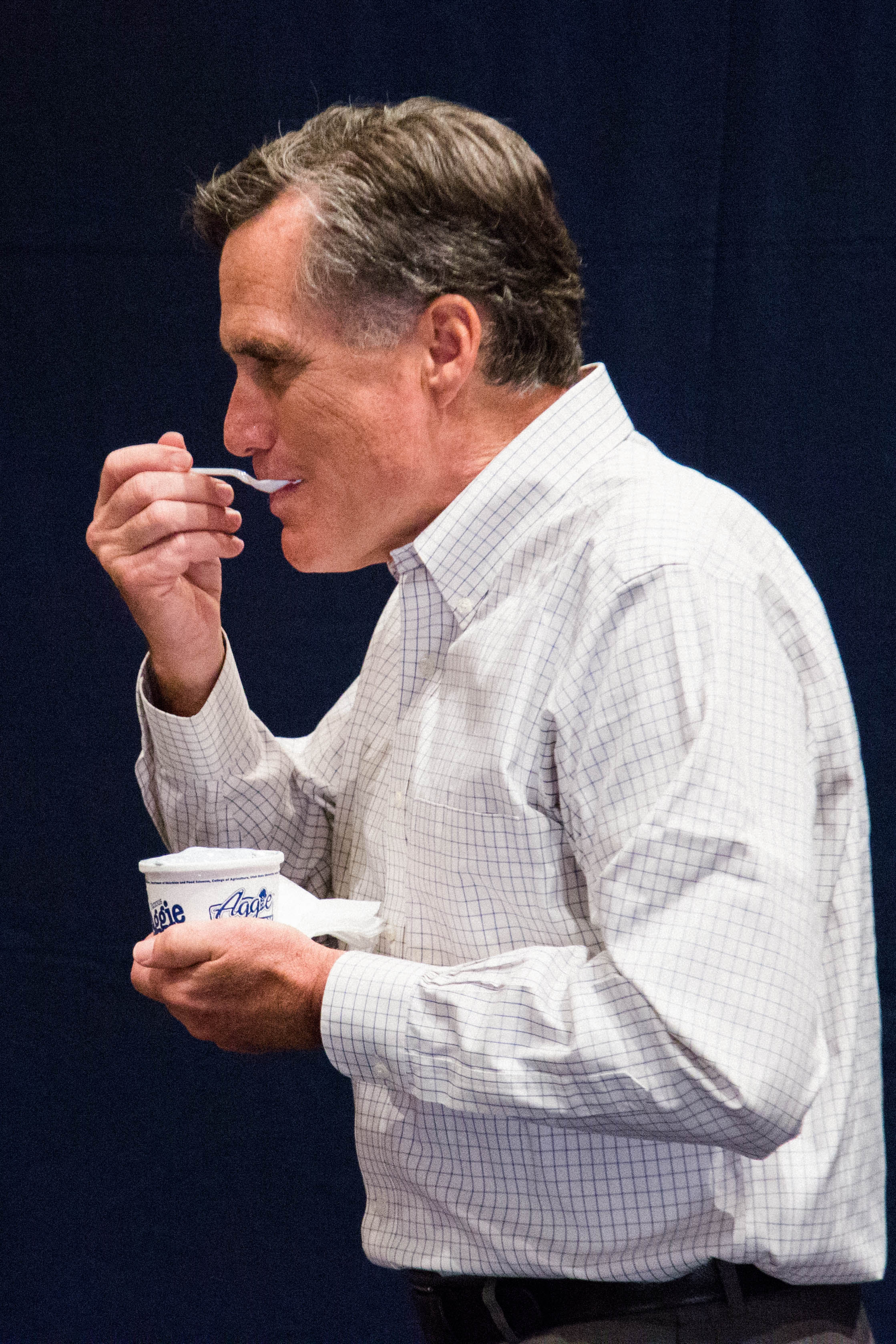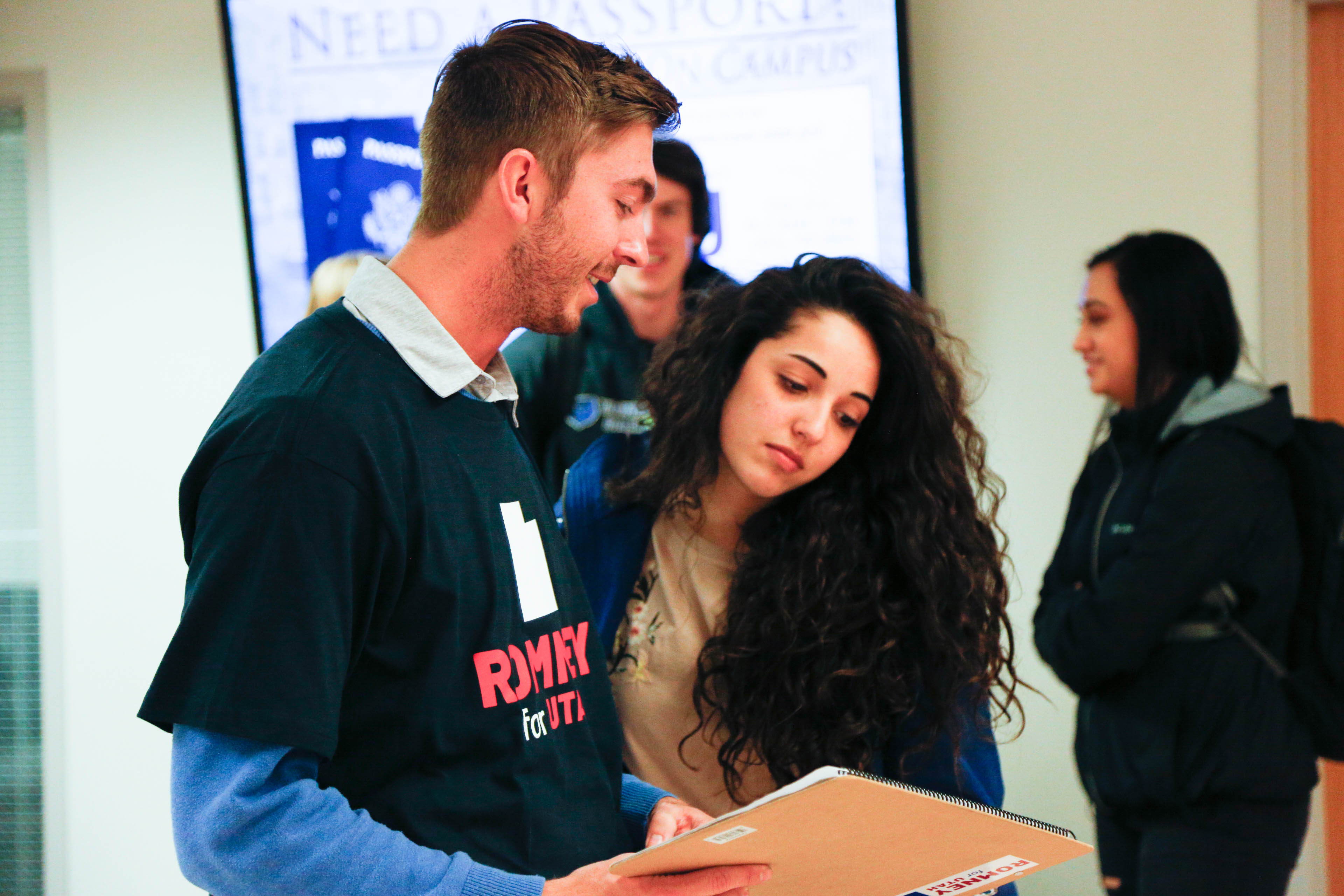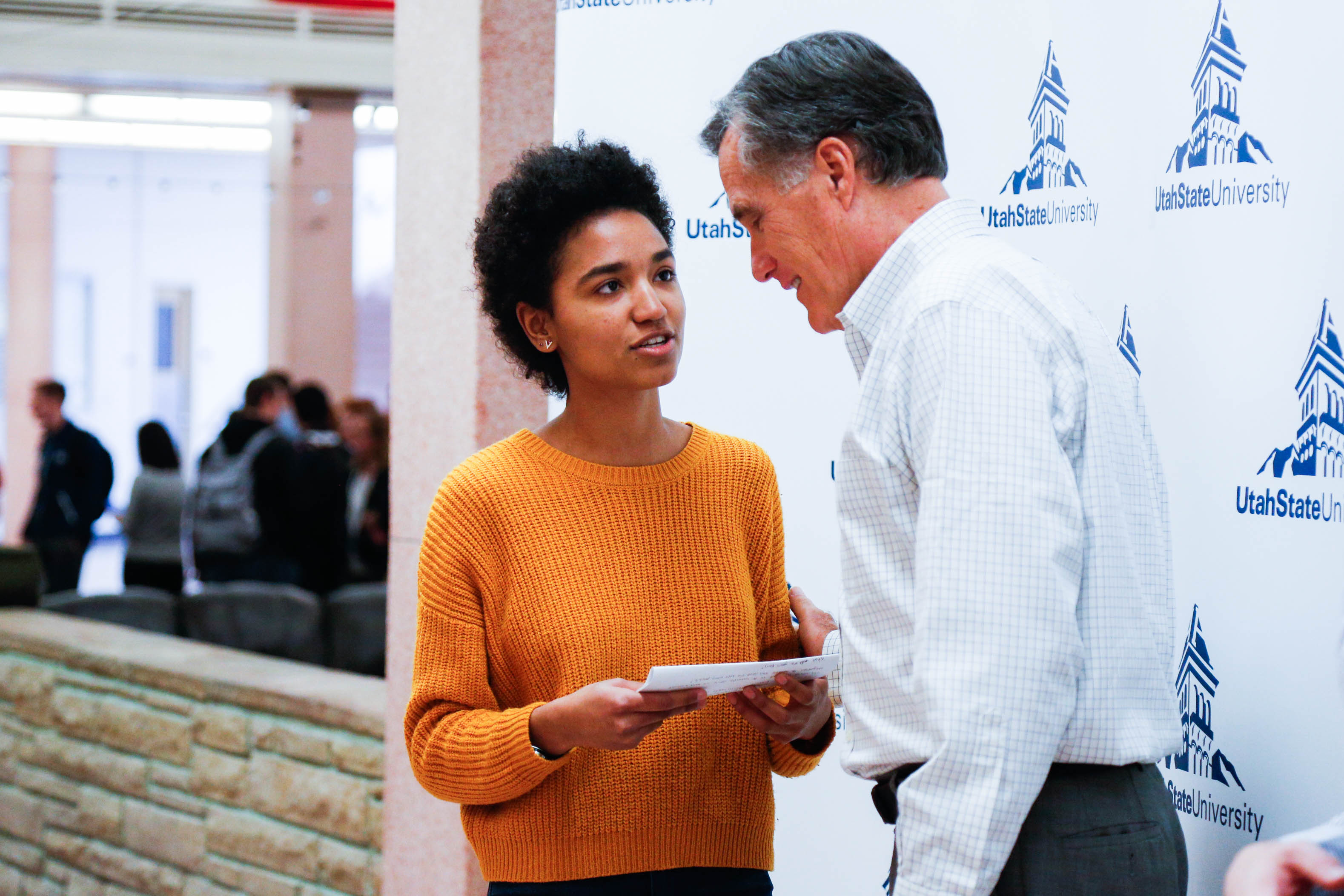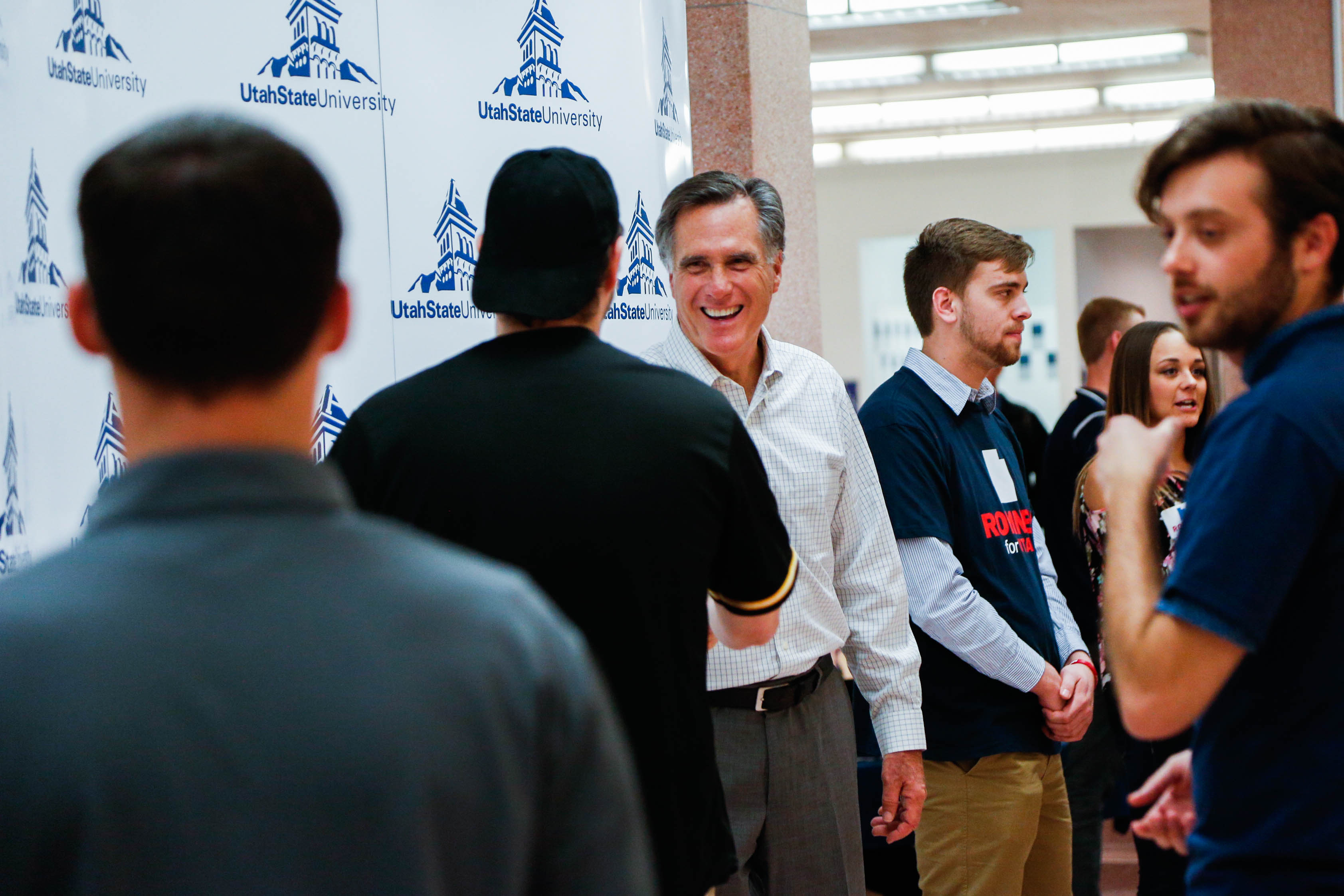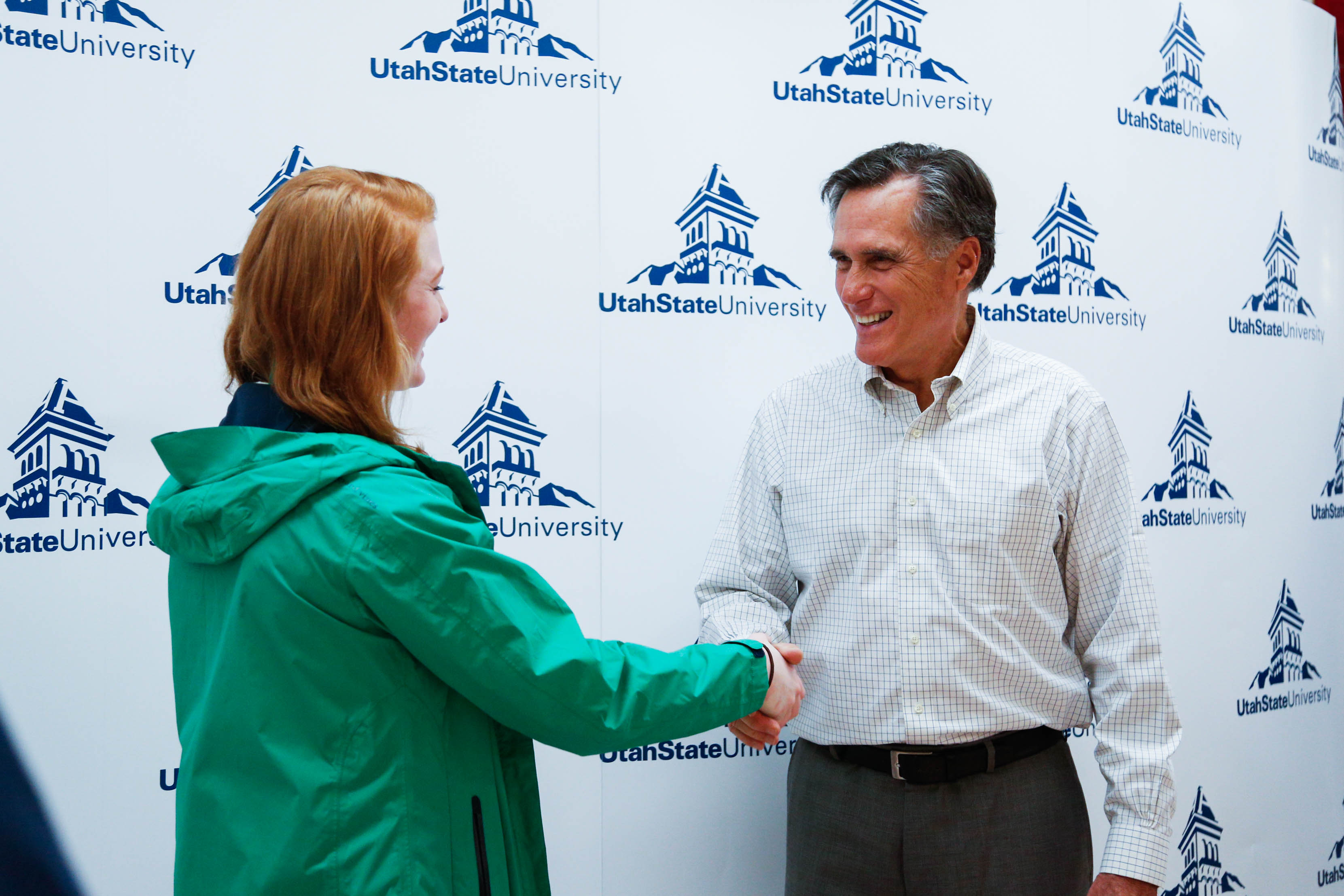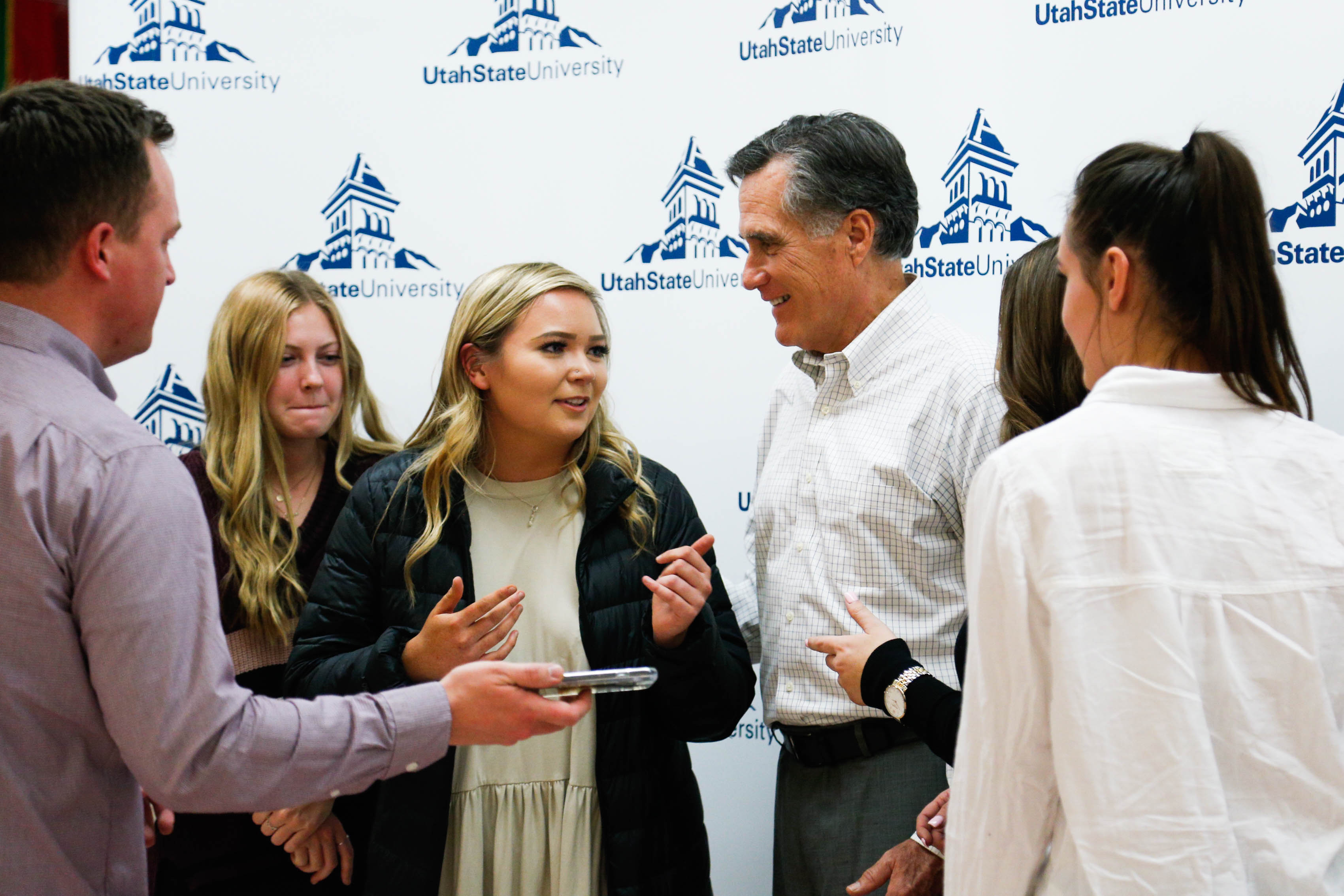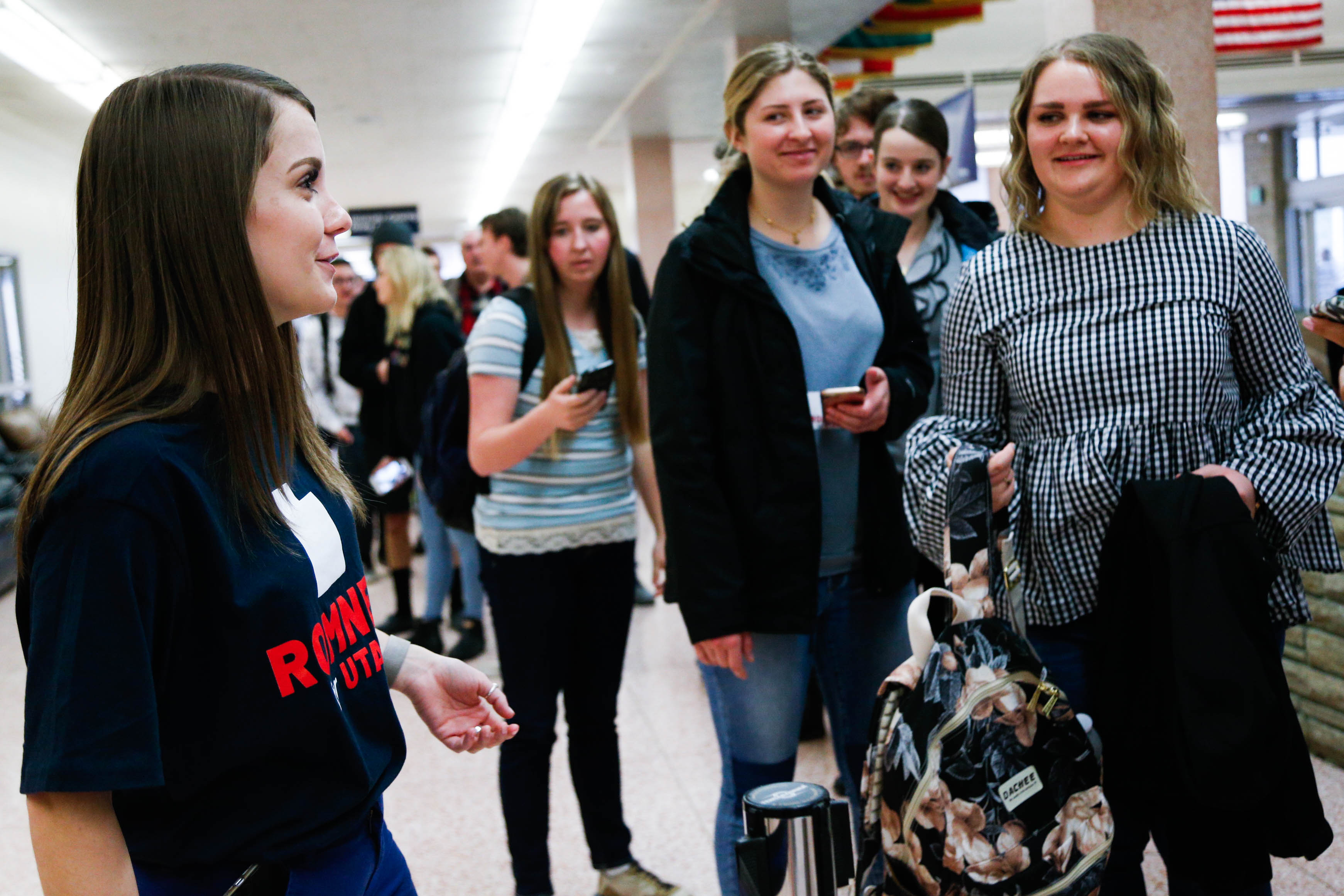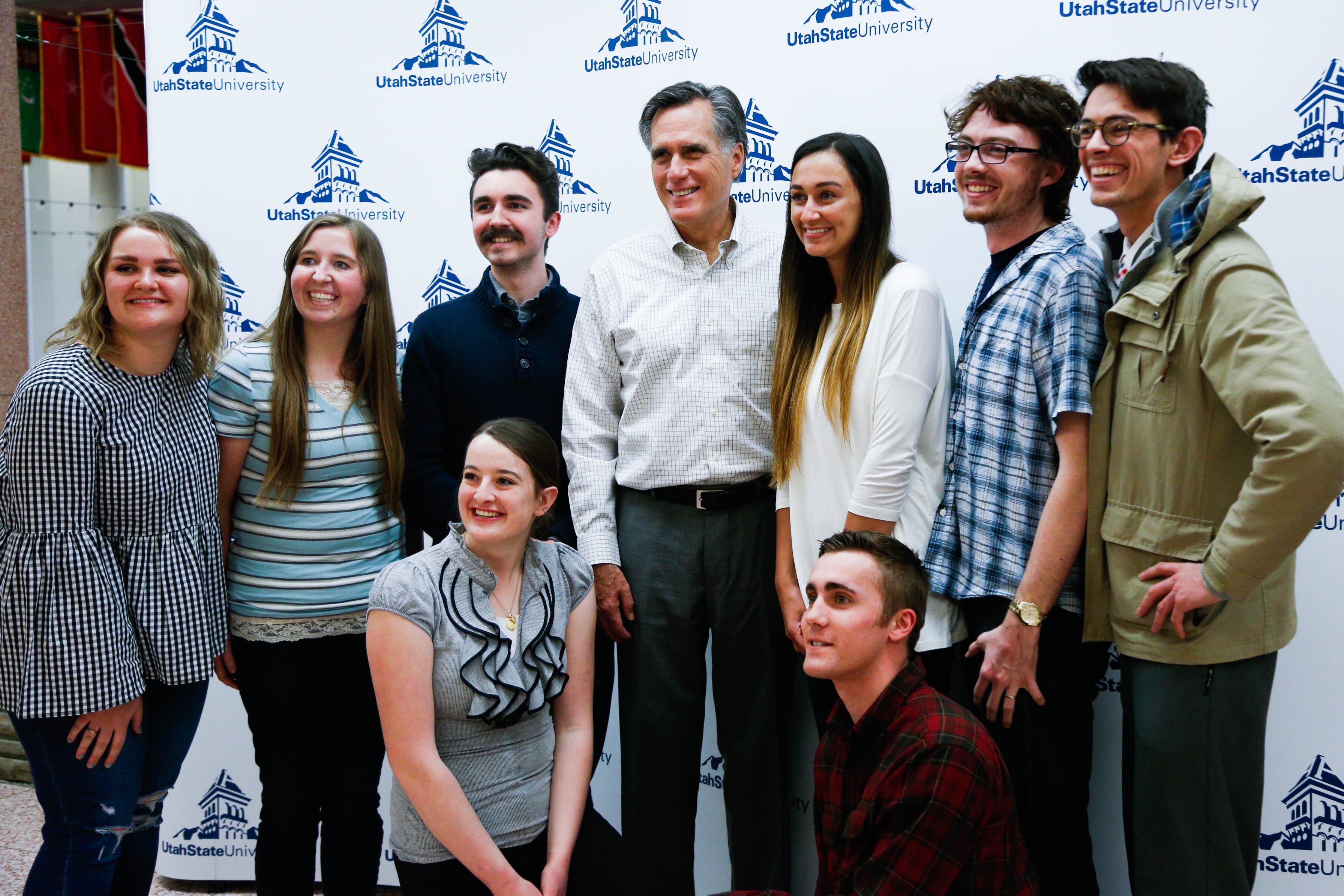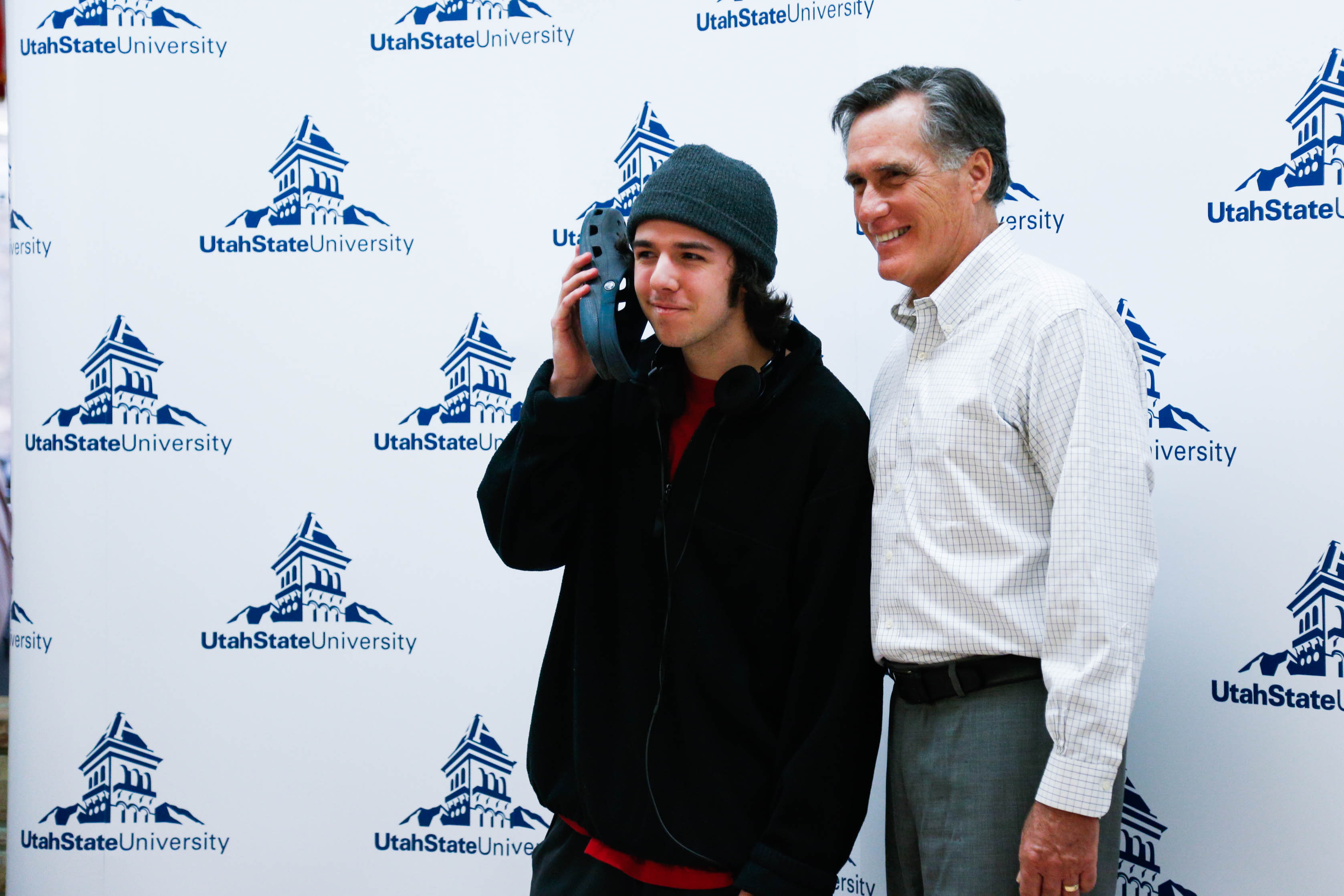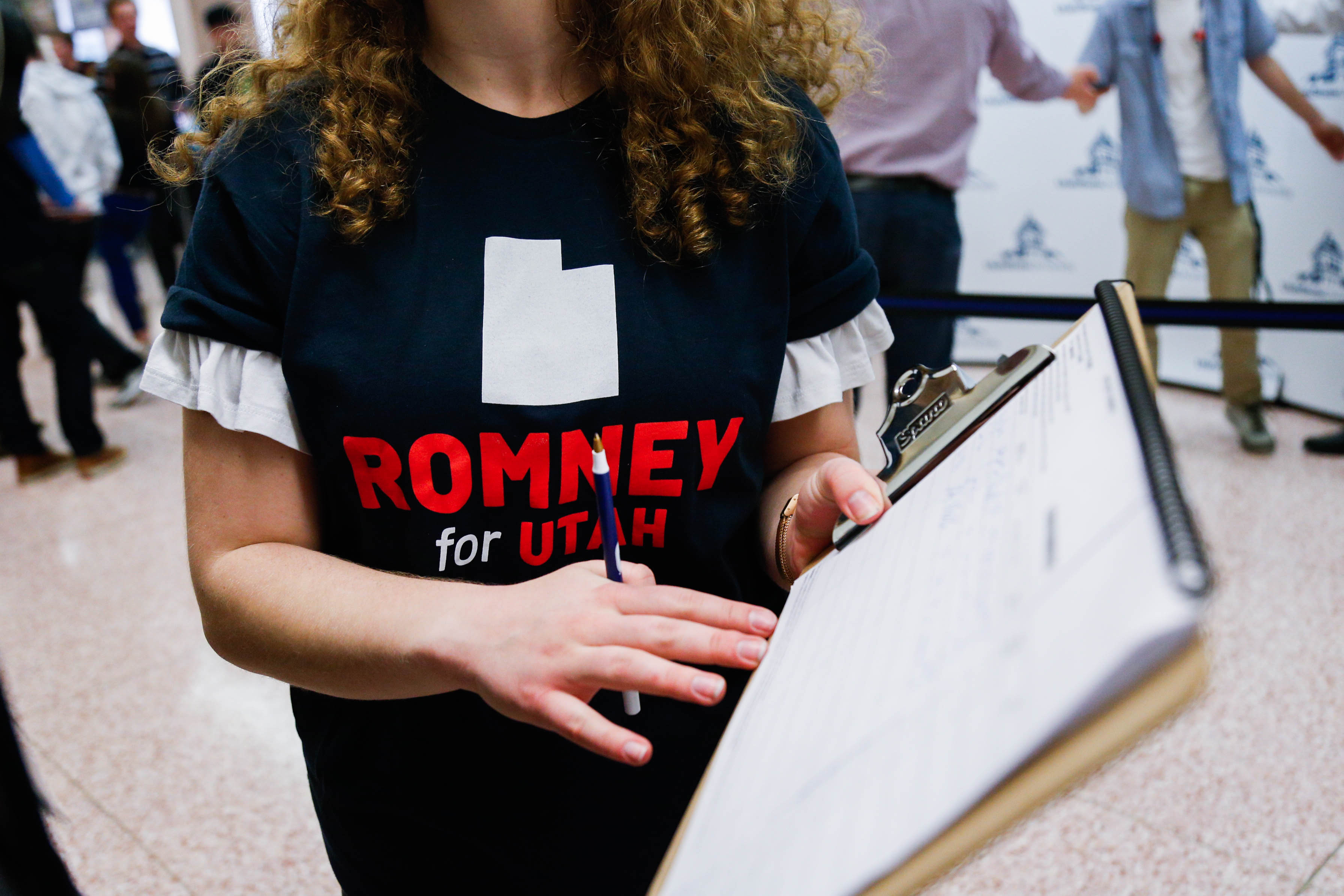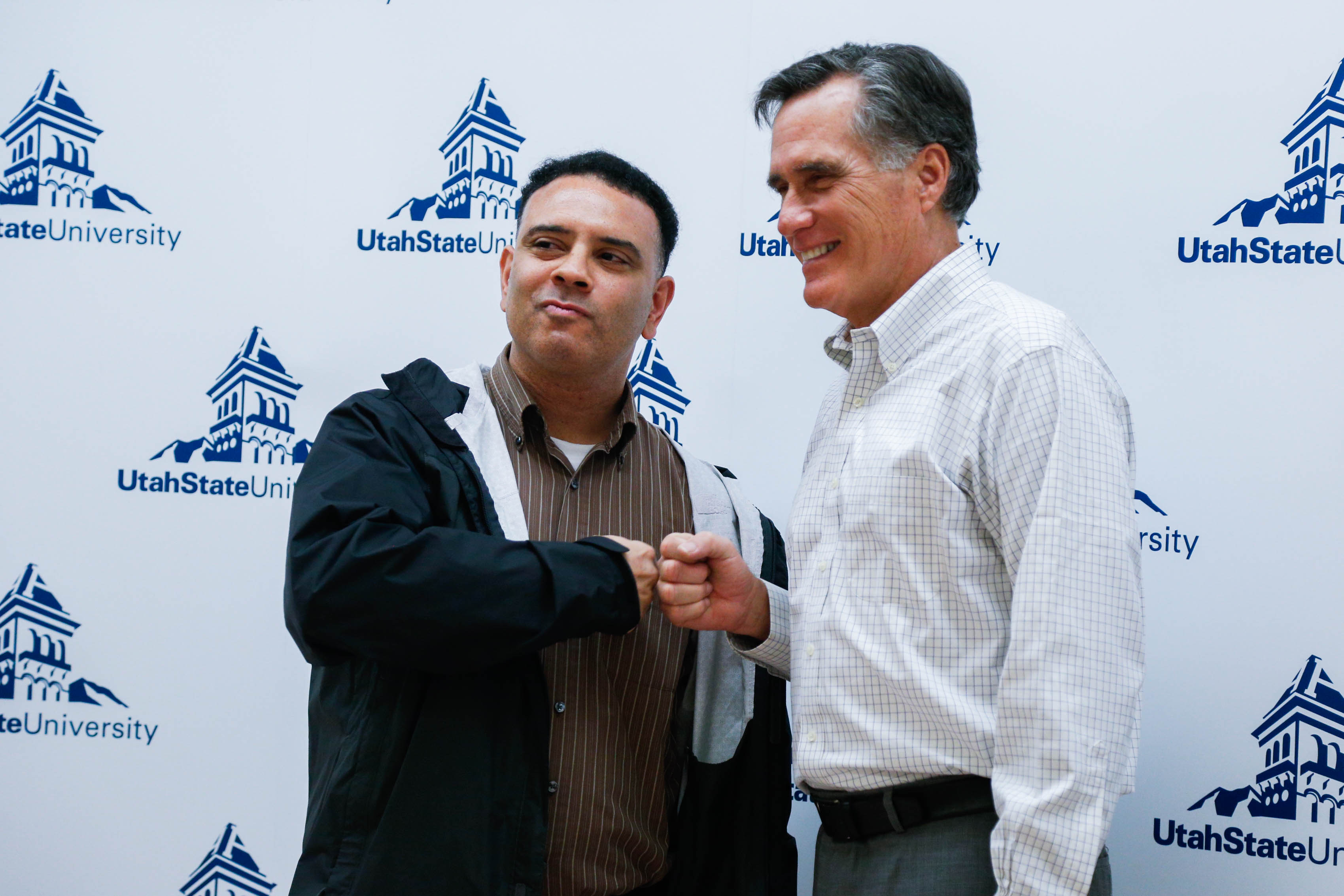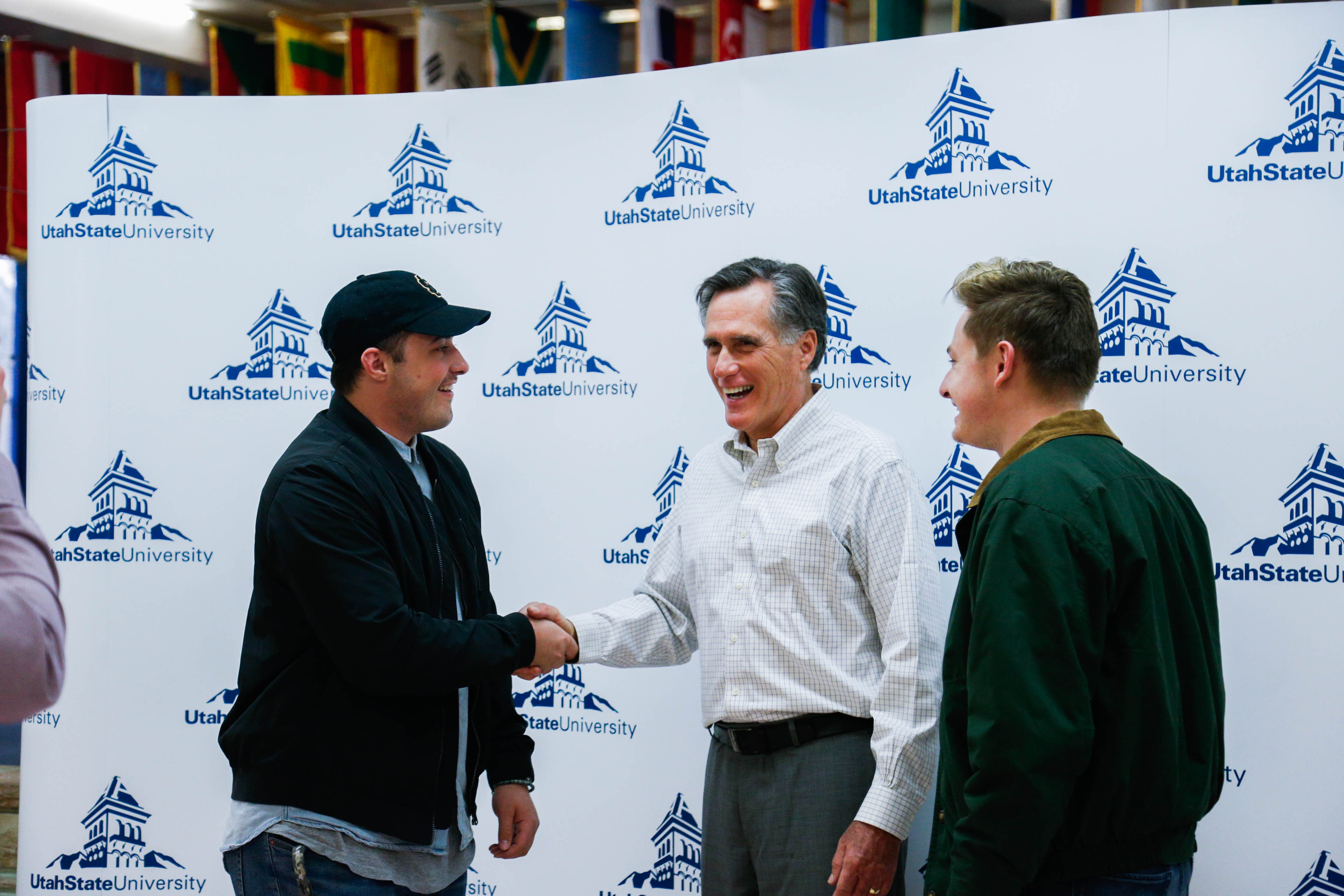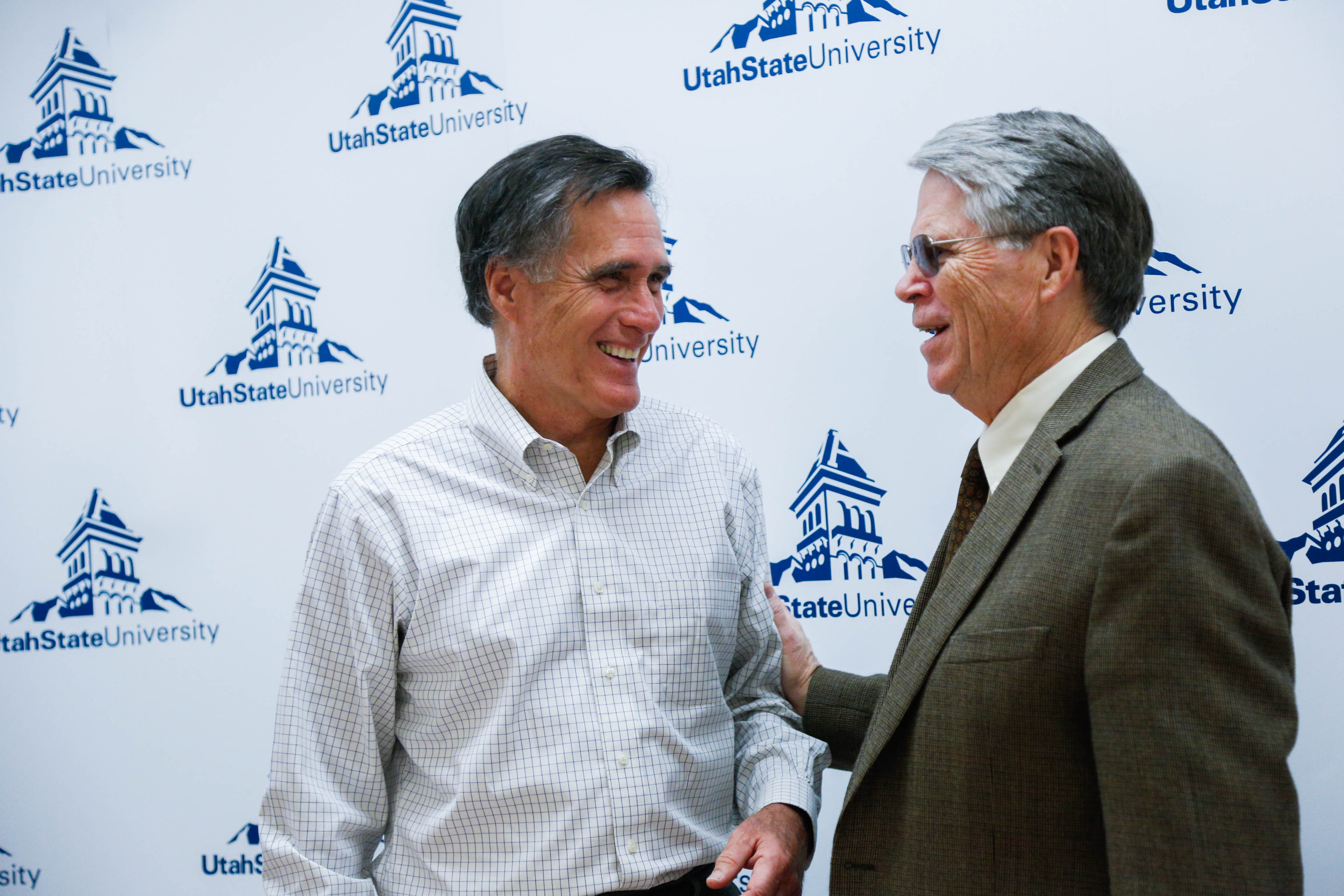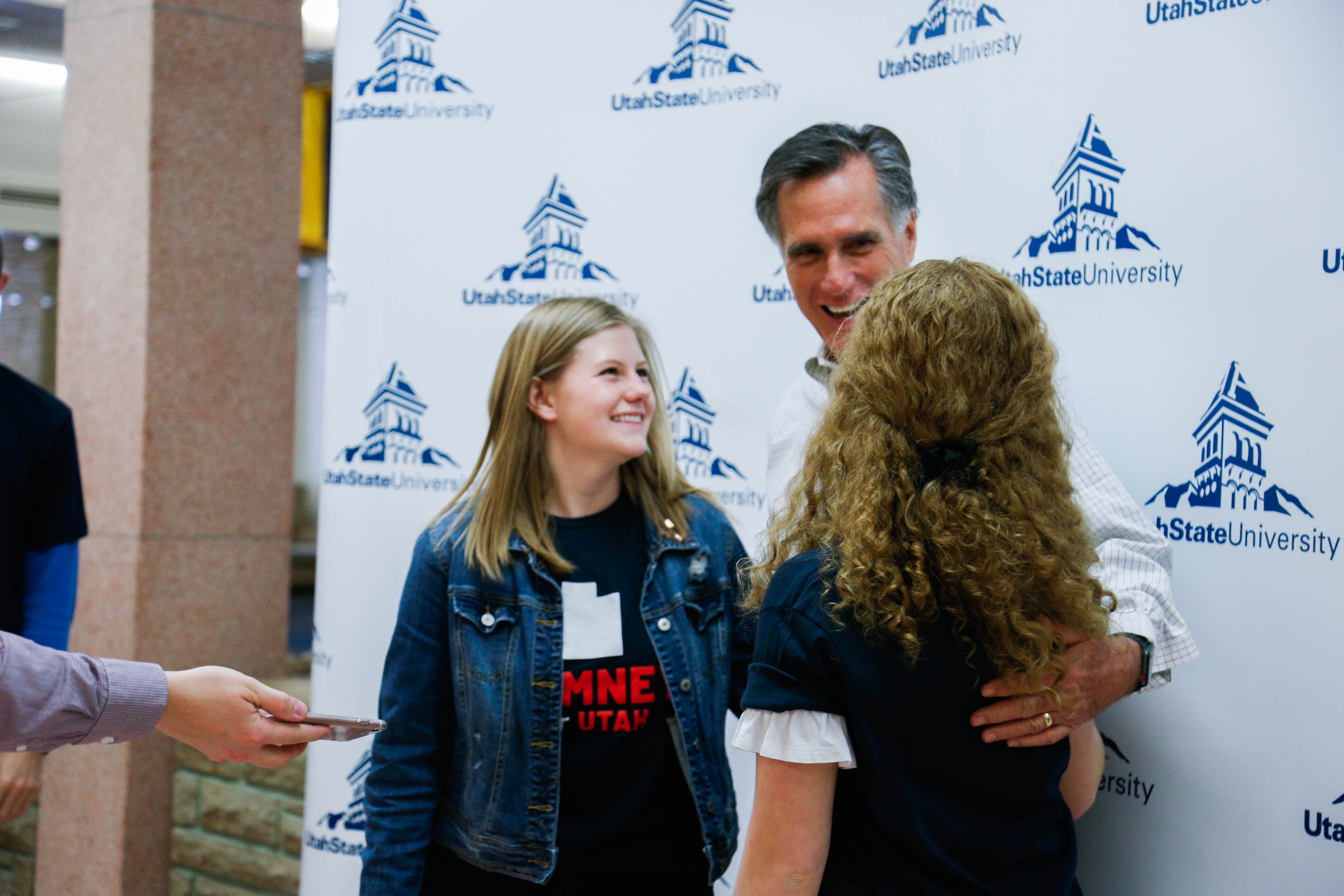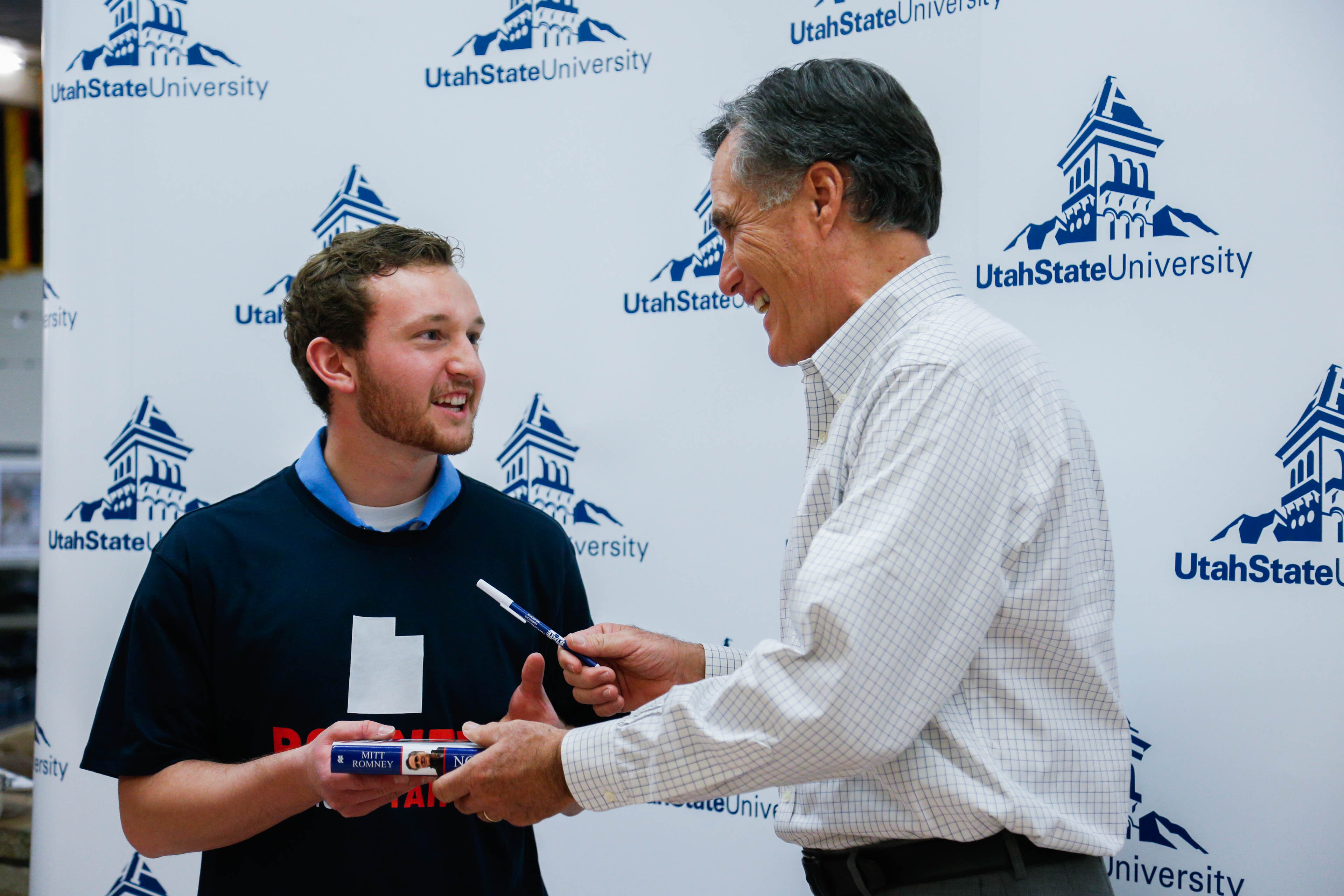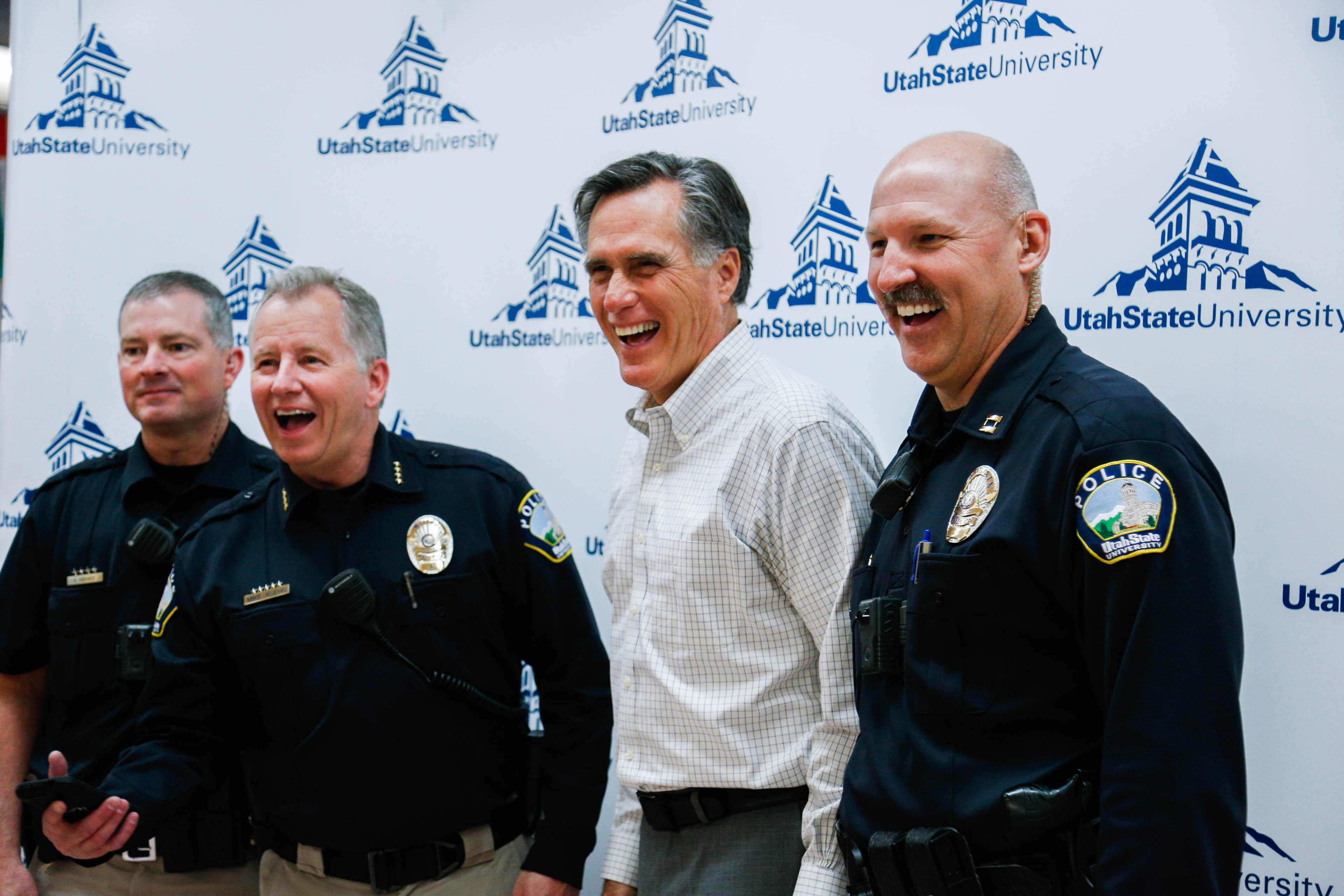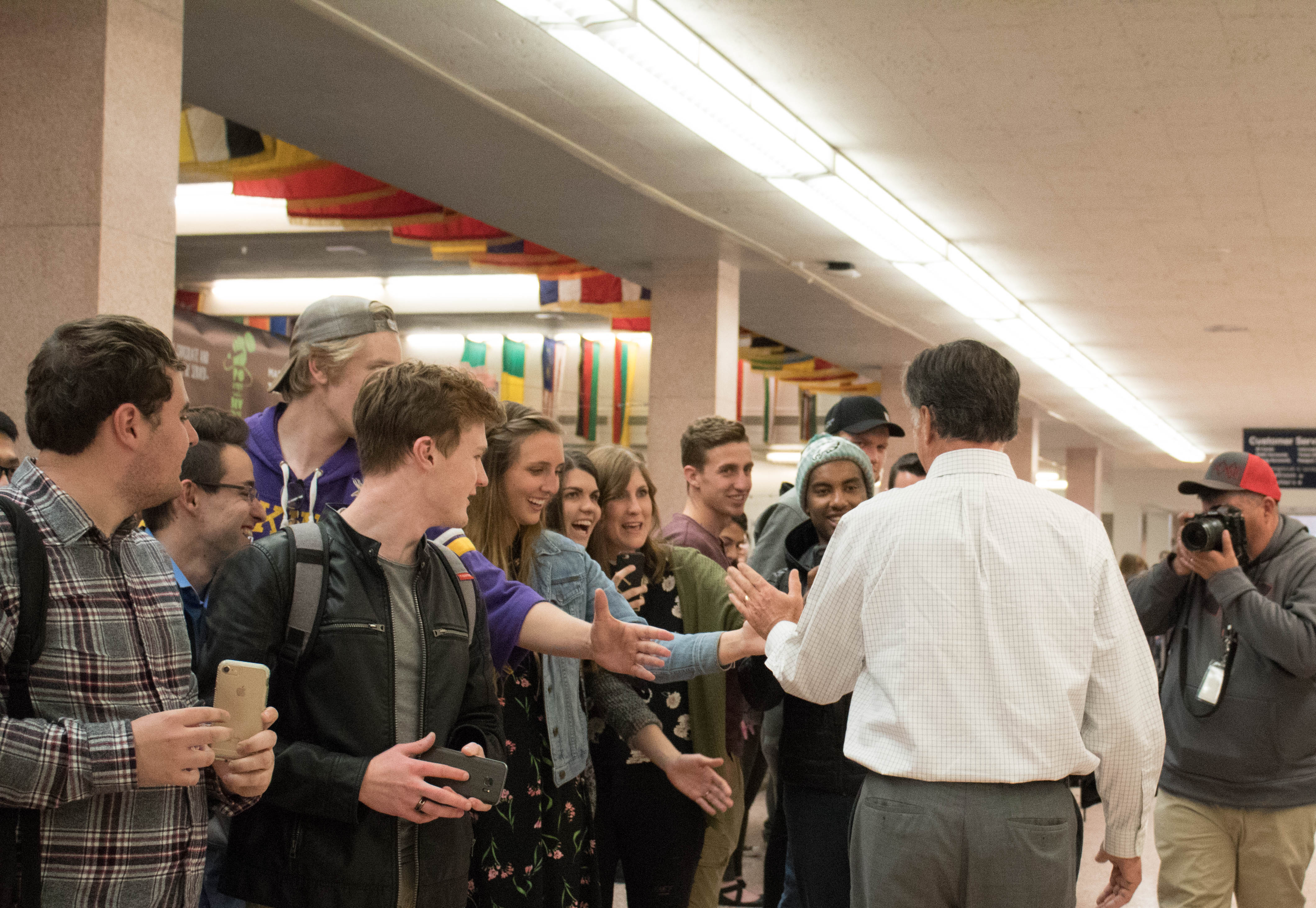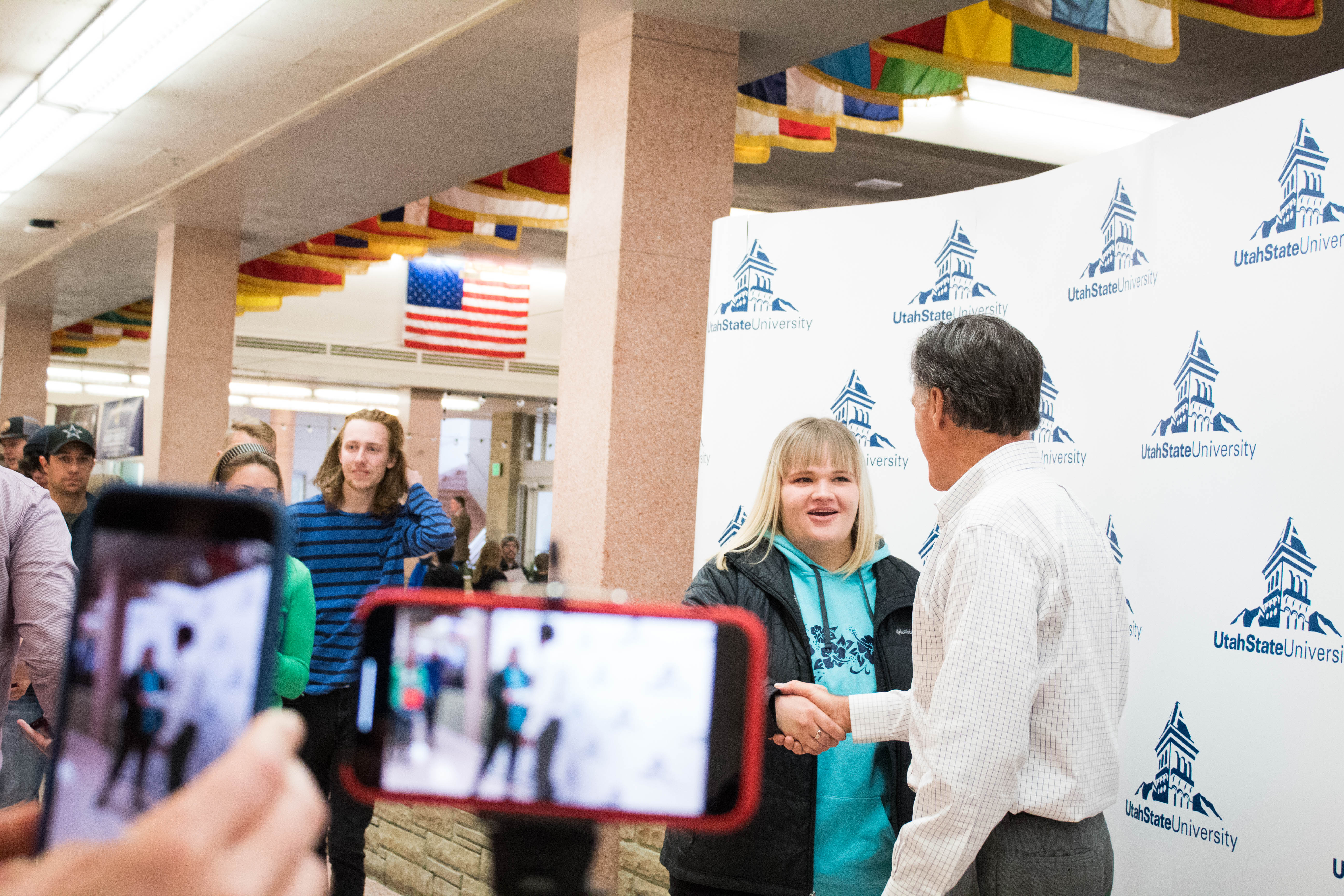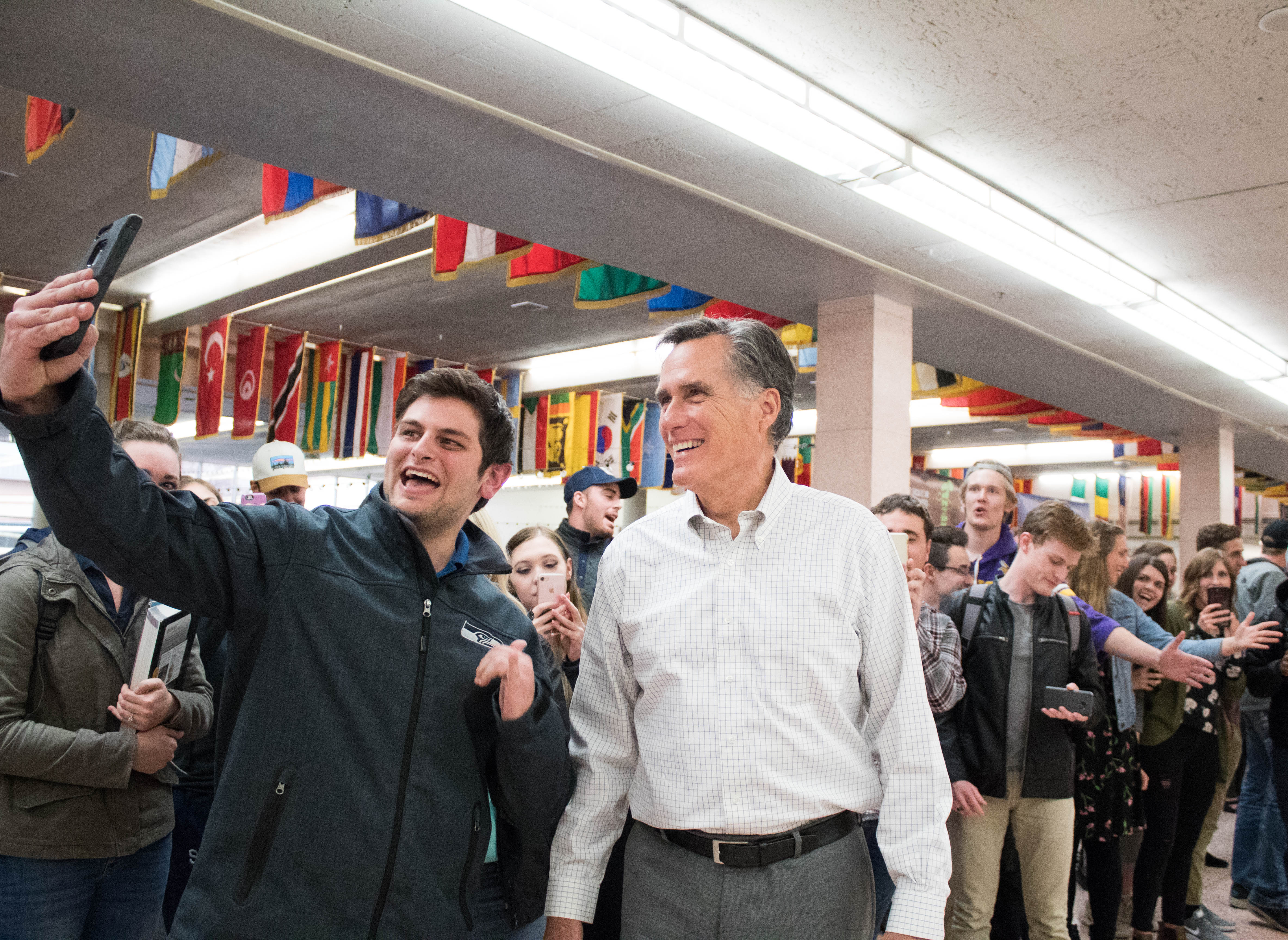Mitt Romney visits USU: Read Q&A here
Mitt Romney, United States Senate candidate for the state of Utah, spent Wednesday experiencing Cache Valley — the former Massachusetts governor went to Angie’s Restaurant, Gossner Foods, then met with Cache County officials and the Logan mayor, Holly Daines. Romney then spent his afternoon teaching a legislative politics class, meeting with Utah State University President Noelle Cockett to discuss involvement throughout rural Utah and shaking hundreds of hands during a meet-and-greet in the Taggart Student Center.
Lastly, Romney sat down for an exclusive interview with The Utah Statesman. The questions and his answers are written below.
The Q&A with Mitt Romney
Q: What do you think is the biggest problem in Utah’s higher education system and how do you hope to fix it?
A: I think the greatest challenge we face in education nationally is making sure that we can attract the very best people to be teachers. In some of the most advanced education systems around the world, such as Finland and Singapore, South Korea, some of the very best and brightest go into teaching, and we have not made it as attractive in our country for some jurisdictions to go into teaching. Compensation isn’t very attractive, starting compensation. Advancement and opportunity is not as people had hoped, and so attracting the very best people into teaching is the single most important thing you can do.
Q: Would you do that by raising compensation?
A: Each state pursues what it thinks is the best path. I served as governor of another state, as you know. Massachusetts has the highest ranked K-12 schools in the country and over 150 colleges and universities. And the key to our success there was measuring the success of our students. If a school was unsuccessful in preparing students for the next grade level, the state was able to step in and take over the administration of the school, and we made a great effort in hiring the very best teachers. You start with compensation, particularly for starting salaries, for teachers.
Q: Are you concerned about the fact that you haven’t spent most of your adult life in Utah? Why are you choosing to run in Utah?
A: I spent 10 years living in Utah. Came to go to school here, came back and had the experience of being part of the Olympic team. And after my career was over, my wife and I made Utah our home. We decided this is the place we would live. We were a bit surprised when Orrin Hatch said he wasn’t going to run for re-election. He had asked me to endorse him, and I told him I would, but he encouraged me to run for senate, and I think by virtue of the relationships I have with the White House, with the president, as well as with some 40 senators who I’ve campaigned with, I have the capacity to do more for Utah than the average junior senator. This represents, I think, an opportunity for me to do my very best to represent our state.
Q: You were a fierce critic of President Trump throughout his candidacy. Since then, you’ve been photographed together, and Kellyanne Conway told CBS News the two of you have “a great relationship.” What is your current relationship with the president like and what can the people of Utah expect to see between the two of you in if you’re elected?
A: President Trump has followed pretty much the mainstream Republican agenda, which I described during my campaign, and that’s during his first year, so I support the lower taxes he put in place and the effort to deregulate and to push back against government overreach. On the other hand, if he says something or does something that I think is divisive or minimizes minority communities or immigrant communities in our country, then I’ll do what I’ve done in the past, which is I’ll speak my mind. I’ll call him like I see him. And the president, I think, respects people who express their views openly, and we’ll continue to have a good, working relationship if I’m lucky enough to become senator.
Q: You frequently talk about bringing “Utah values” to Washington. What does this mean, and how can you carry this out under the current administration?
A: Utah is doing pretty well on a whole host of fronts. Utah, for instance, balances its budget. Washington doesn’t — I’d like to see that change. Utah exports more than it imports. Washington, or the nation, they don’t get that done right. Utah has had the fastest growing employment in the country — that’s something Washington could learn from. Utah has seen median wages go up, Washington could learn about how to get wages up. And so those kinds of values, I think, are appropriate for Washington, and then there’s some others. Utah welcomes people who come here from other countries — immigrants — and I think that spirit of welcoming people is a Utah value that Washington could use. And I’d say, finally, and there’s a long list, but finally, I’d note that Republicans and Democrats get along on Capitol Hill in Utah, and not so well in Washington, and I hope to be able to reach across the aisle in a way that is reminiscent of the values here in our state.
Q: As governor of Massachusetts, you signed a ban on assault weapons, but in a 2008 debate, you mentioned you would not support any new legislation on a federal ban of assault weapons. Several Utah K-12 students conducted “walkouts” at their schools today to protest gun violence and support gun control. What’s your stance on the issue now? If you support stricter gun legislation, how do you feel you can work with others in Congress to find a solution?
A: I don’t support new, federal gun legislation. I haven’t seen any that would have prevented the terrible attacks that have occured. There are a couple exceptions. One, I think bump stocks should be taken off the market. And two, I think the federal government can provide a much better service in background checks to make sure that people who are mentally disturbed and present a threat to themselves and to others are not purchasing weapons. But most gun legislation and school safety legislation, I think should be created at the state level. I believe the best course for our schools here in Utah, is for counties and the state to take action that we believe is best for our own students.
Q: Do you support the students performing walkouts today?
A: You know, I think the level of student involvement and activity with regards to school safety is totally appropriate and laudable. That doesn’t mean I agree with everything every student says, by any means, but I think having more young people recognize that decisions are being made that affect their freedom, their livelihood and their safety, and that’s a good thing.
Q: There are about 9,000 DACA recipients in Utah. How would you support a path to citizenship for them and would your support also include support for the border wall as President Trump has said that he would like?
A: When I ran for president in 2012, I did not support the Dream Act as it was written, but I didn’t win. And President Obama made representations to DACA young people that they relied upon. So I believe that those people should be able to stay in the country legally, as President Trump has proposed. In terms of a pathway to citizenship I don’t believe in a special pathway. I believe that they should get in line like everybody else, and if the have the skills and experience and merit to become a U.S. citizen, then they can ultimately reach that objective. I support securing our border, as well as something known as e-verify, a system where employers can find out easily whether someone is legal or not. And if they’re not legal, then I would sanction employers for hiring people that are not here legally.
Q: You mentioned securing our borders, would that be in the form of a Mexico border wall or did you have something else in mind?
A: I had nothing other than a wall, fence, technology drones, all the different technology used to protect our border. But ultimately, you realize that many of the people who come here and stay here illegally came here legally in the first place. They had a temporary visa, a tourist visa and in order to really secure the border, we don’t just need a physical border, but we also need a system to identify those that are here illegally and make sure they don’t take American jobs.
Q: You served as a Republican governor in a primarily Democratic state. Do you feel like that would be a significant benefit to you for working with Democrats in the senate if you’re elected?
A: I have learned, having served in a state where my legislature was overwhelmingly Democrat, that to get something done of a lasting nature, you have to reach across the aisle, and see if there’s common ground to be found. Often times there’s not, and you just can’t get something done. But most of the time, you can find some way to reach agreement, and I think we need more of that in Washington. It happens here in Utah. the legislature, Republican, Democrat and the governor, they get along, personally. They’re able to find enough common ground that Utah actually takes some pretty meaningful steps every year in a pretty short legislative season, and I’d like to be able to apply that kind of approach to Washington.
Q: Can people expect to see significant differences between Senator Hatch and you, if elected?
A: Well, no one can really fill Senator Hatch’s shoes. Not only are they big shoes, but they’ve been there a long time, and they have a lot of clout in Washington. I hope that by virtue of the relationships I have in Washington, that I will be able to accomplish more than might the average incoming freshman senator. At the same time, Senator Hatch and I see pretty much eye-to-eye on most issues. I don’t know that I’ve gone through every single issue that he has taken a position on, but we’re pretty similar. That’s why I endorsed him in the past and would have endorsed him for his re-election. And then there were, of course, Utah-specific issues where he has really taken a lead. Pushing back on the federal overreach on Bears Ears and Grand Staircase, I think that was the right action for him to take. And he’s been very helpful in securing research funding for Utah State University as well as other institutions of higher learning in the state. Those are things I would see as a big part of the job of the United States senator from Utah.
@alison__berg

